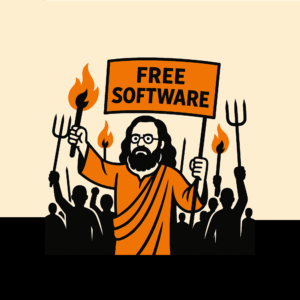 Our recent post, The Insanity of the Richard Stallman Lifestyle and the Psychology Behind It, has generated quite a bit of discussion on LowEndTalk, as well as a comment here on LowEndTalk.
Our recent post, The Insanity of the Richard Stallman Lifestyle and the Psychology Behind It, has generated quite a bit of discussion on LowEndTalk, as well as a comment here on LowEndTalk.
Calvyn Lee asked:
Do you think his extreme habits are necessary to truly live out the free software philosophy, or could someone be just as committed without going to such lengths?
I think Richard Stallman’s answer to this is no. He’s a maximalist who views anything less than ideological purity as a complete betrayal of one’s views. As we explored in the previous article, this extends to every facet of his life. He doesn’t have a cell phone, for example – partly because of surveillance fears, but also because there’s no cell phone that runs on 100% free software. He believes everyone in the world should throw their cell phone away.
But I think you can be a free software advocate and try to work for a better world without rejecting modern society.
To draw some parallels:
- You can drive a car and still be an environmentalist. If you’re somewhere and there’s no ready source of water except plastic bottles, you can buy one (and recycle it when you’re done) without self-labeling as a destroyer of the ecosystem.
- You can be a capitalist without worshipping the market like a golden calf. Lots of people believe in free markets yet also support social safety nets.
- There are hardcore vegans who won’t eat honey because it exploits bees, but there are plenty of pesco-vegetarians, too.
Stallman is a zealot. That’s not a personal insult – it’s a statement of style and conviction. For Stallman, there is no compromise, no gray area, no pragmatic exceptions. If your code isn’t under an FSF-approved license, you’re not part of the movement. If you use proprietary software, you’re sinning. If you so much as install a driver with a binary blob, you’ve betrayed the cause. It’s a “if you’re not with us, you’re against us” mindset.
And he’s wrong about that. Or at least, he’s wrong that everyone else needs to be that way too.
You can believe in free software — passionately — without refusing to touch anything that doesn’t fit a rigid ideology. Just as faith without love is empty ritual, software freedom without practicality becomes self-defeating.
Purity is comforting because it’s simple. The real world, however, is not. And we make more progress with fewer Robespierres and more pragmatists.
The best way to advocate for free software is to write some free software. Linux dominates the modern datacenter because it’s free (in both senses), is high quality, and has attracted a robust ecosystem which all major software vendors plug into. Postgres continues to ascend because it’s free (in both senses), is high quality, and has attracted a robust ecosystem. Git, Python…the list goes on. Adobe Photoshop dominates that market because it’s the best product out there. If GIMP or another product was better than Photoshop, people would switch.
That’s the way to make progress. Throwing your cell phone away, refusing to use DoorDash, or objecting to any video that isn’t encoded with Ogg Vorbis does nothing to push the free software agenda forward.
The goal isn’t to worship the concept of freedom like an idol. The goal is to build a world where users have options, where software empowers instead of exploits, and where communities thrive outside corporate control. That mission doesn’t require ideological purity. It requires persistence, creativity, and inclusivity – the willingness to meet people where they are, not demand they first memorize the catechism of software freedom.
You don’t have to be Stallman to care deeply about user rights, privacy, and transparency. You just have to believe that people deserve control over the tools they use, and be willing to act on it, even imperfectly.
The bottom line is that zealots start revolutions, but pragmatists build civilizations.
At least that’s how I see it. How about you?























Leave a Reply